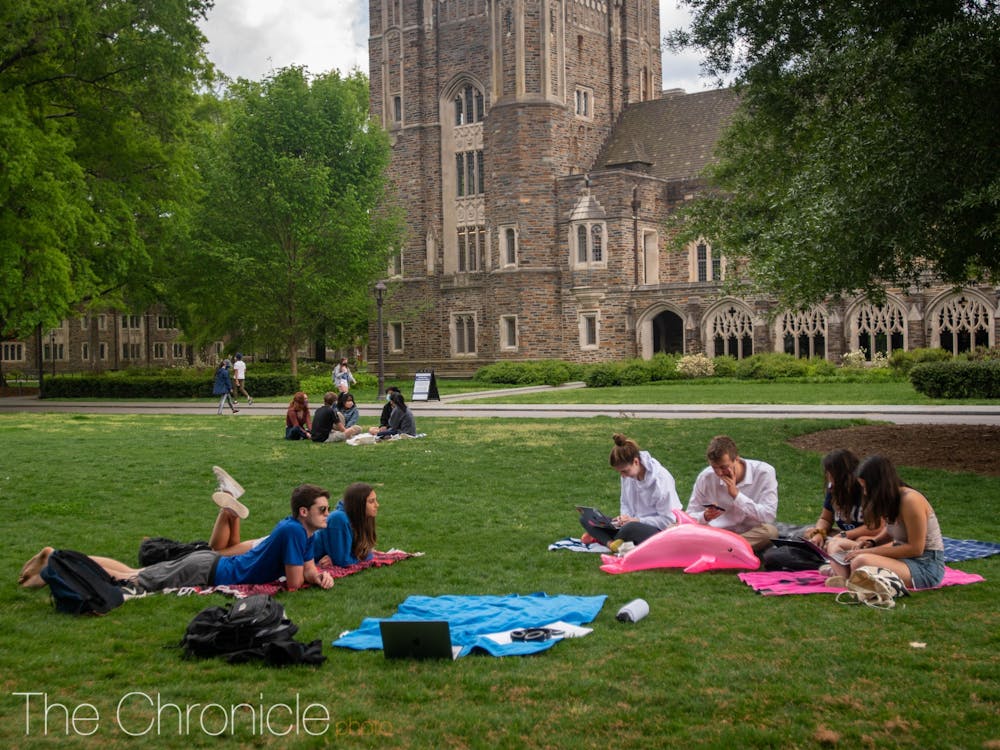Students both over and under 21 years old expressed varying opinions about Duke’s new alcohol policies, which aim to increase on-campus social gatherings.
Called Fun @ Duke, these policies are a part of QuadEx and include allowing Student Organization Finance Committee-approved student groups to use up to $7 in SOFC funds for alcohol per undergraduate over 21 years of age at an event. There must be one social host — “sober, active bystanders that assist in promoting safe, social behaviors for all those attending” — for every 25 attendees for an event with alcohol. Students can also now reserve campus spaces to hold social events.
In conversations with “hundreds of students,” Student Affairs found that “on-campus social events are safer, more convenient to attend and more inclusive due to their costless nature,” according to a Student Affairs guide to holding events with alcohol.
These policy changes only apply to West Campus spaces. East Campus remains a dry campus and alcohol is not permitted, which remains unchanged from the previous policy.
Practical concerns
Though appreciative of new on-campus opportunities, junior Thomas Freireich thought some important topics were left out of the policies — namely the burdens placed upon social hosts.
“There are issues, like you don't know who's going to be at a party if it's an open event. When people are drinking and some people can’t control their alcohol consumption, there's liability with that,” Freierich said. “You're placing a lot of responsibility on the one sober person to handle all of that.”
“It seems like [administrators] think it's going to go all happy-go-lucky. And, you know, trial by fire isn't necessarily the best thing for something like this,” he continued.
Sophomore Jillian Jacobs also expressed some confusion at the practicality of new policies, worrying that strict restrictions for which events students could purchase alcohol through Duke — notably Orientation Week — would essentially make the rules void.
“I feel like since the rules are so complicated, it kind of reduces how frequently they will be used … if no one's really able to capitalize on the new policies, then I guess they’re not really doing much,” Jacobs said.
Crowell Quad Co-President Robert Sprung, a junior, wondered about the cost of holding events with alcohol through a licensed service or host-provided vendors and questioned how many student groups would pay that fee, even with SOFC’s assistance.
“I don't think there are a lot of 21-plus people that are here [on-campus],” Sprung said. “I feel like if we were going to do something drinking-wise, I could already legally purchase my own alcohol. I don't really see why [an organization] would pay the upcharged rate for a bartender when they could just have older people buy their own alcohol for themselves.”
And as an underage student, Jacobs questioned the motives behind every student paying for an amenity that only some — namely those above the legal drinking age — would utilize.
“It might not really be the University's responsibility to fund essentially providing a drug to students,” Jacobs said. “I feel like it would be [the University’s] responsibility to allocate those funds in a different area. But again, I do understand and appreciate their goal of making access to alcohol more equitable for everyone.”
Drinking culture on campus
Junior Shreya Joshi, vice president of the Duke Student Government Campus Life committee, saw Fun @ Duke, which was designed by multiple groups including DSG, as the perfect opportunity to “level the playing field” in terms of access to alcohol. She feels hopeful towards the success of the initiative on campus.
As a student under 21 years old, she believes that providing on-campus places to drink would be beneficial for students of age.
“I feel like part of the problem has always been that you want to host something with your friends, or you want to do something in a space, but you just don't know how,” Joshi said. “The issue is that right now, because people are having to go off-campus to get access to alcohol, it's only people that can afford to put it on their own credit card that can get it — it's an equity issue.”
Jacobs had more significant worries about the effects of such an initiative on the culture of drinking on campus.
“I could see [Fun @ Duke] being used, and it being successful,” Jacobs said. “I feel like it's more significant, just in terms of the statement it's making about the role that alcohol plays [in] Duke’s social scene, rather than like the actual policy itself.”
Sprung agreed that Fun @ Duke was very much a “step in the right direction.” As someone who is over the legal drinking age, Sprung appreciated the heightened freedom.
“I’ll get to hang out with my friends in clubs, and it's great that I'll be able to drink in a legal way on campus with alcohol,” Sprung said.
As someone above the legal drinking age, Freireich hoped that students his age would get to enjoy on-campus experiences in a new way.
“I think it's a step in the right direction, making Duke itself have more responsibility for students’ actions, and I think that that's a good thing for now,” Freireich said. “I guess we’ll see how it pans out. But I'm not opposed to the idea of going out to my quad and drinking and having a good time.”
Get The Chronicle straight to your inbox
Signup for our weekly newsletter. Cancel at any time.

Ishani Raha is a Pratt junior and a senior editor of The Chronicle's 119th volume.

